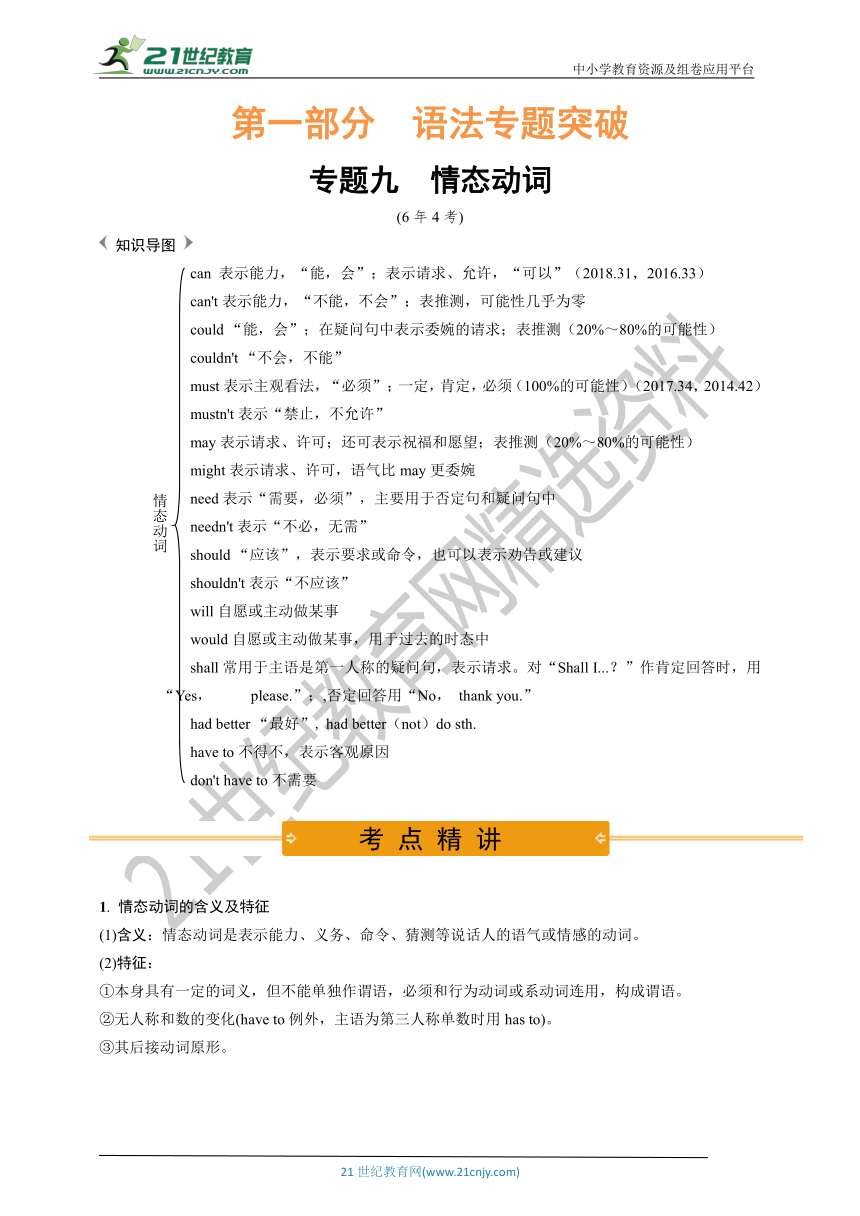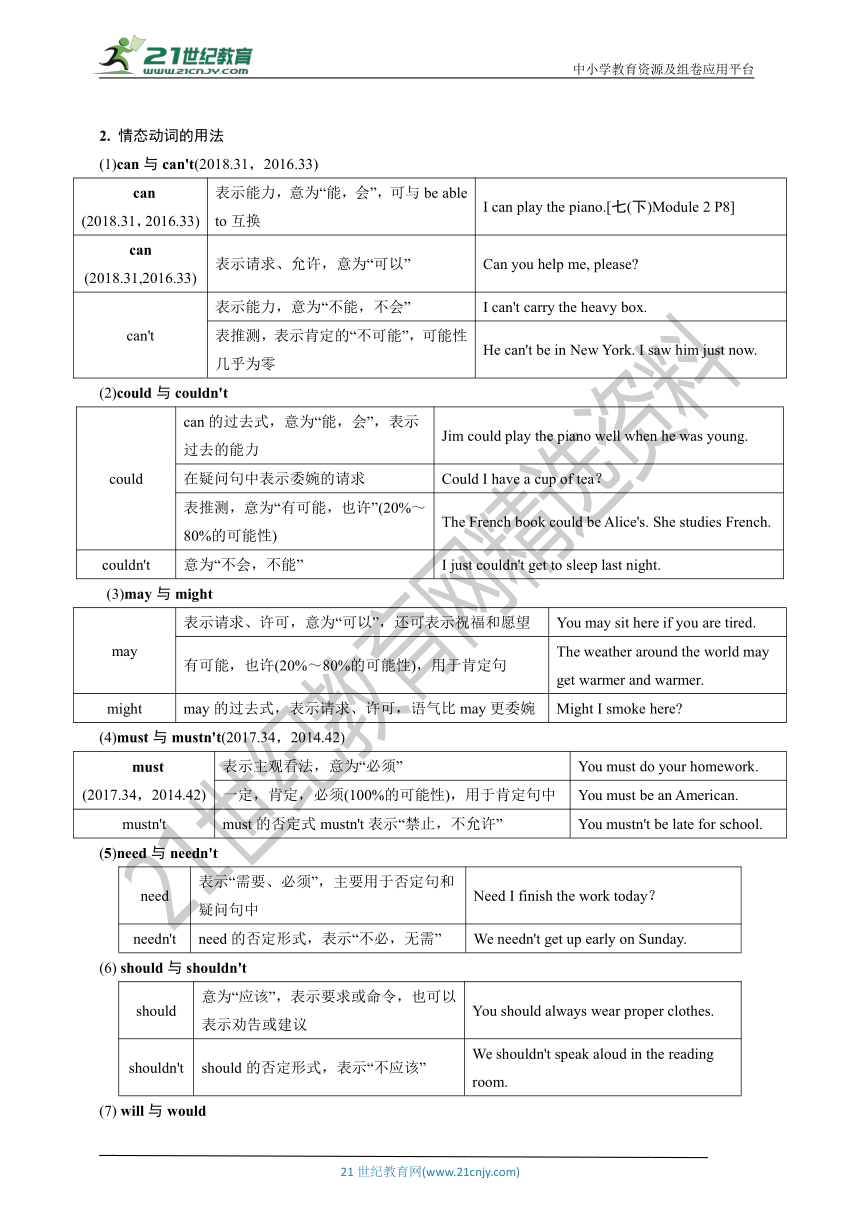2020年广西中考英语备考语法专题系列导学案:情态动词(含答案)
文档属性
| 名称 | 2020年广西中考英语备考语法专题系列导学案:情态动词(含答案) |

|
|
| 格式 | zip | ||
| 文件大小 | 1.1MB | ||
| 资源类型 | 试卷 | ||
| 版本资源 | 通用版 | ||
| 科目 | 英语 | ||
| 更新时间 | 2020-02-25 00:00:00 | ||
图片预览


文档简介
第一部分 语法专题突破
专题九 情态动词
(6年4考)
知识导图
can 表示能力,“能,会”;表示请求、允许,“可以”(2018.31,2016.33)
can't表示能力,“不能,不会”;表推测,可能性几乎为零
could “能,会”;在疑问句中表示委婉的请求;表推测(20%~80%的可能性)
couldn't “不会,不能”
must表示主观看法,“必须”;一定,肯定,必须(100%的可能性)(2017.34,2014.42)
mustn't表示“禁止,不允许”
may表示请求、许可;还可表示祝福和愿望;表推测(20%~80%的可能性)
might表示请求、许可,语气比may更委婉
need表示“需要,必须”,主要用于否定句和疑问句中
needn't表示“不必,无需”
should “应该”,表示要求或命令,也可以表示劝告或建议
shouldn't表示“不应该”
will自愿或主动做某事
would自愿或主动做某事,用于过去的时态中
shall常用于主语是第一人称的疑问句,表示请求。对“Shall I...?”作肯定回答时,用“Yes, please.”;,否定回答用“No, thank you.”
had better “最好”, had better(not)do sth.
have to不得不,表示客观原因
don't have to不需要
考 点 精 讲
1. 情态动词的含义及特征
(1)含义:情态动词是表示能力、义务、命令、猜测等说话人的语气或情感的动词。
(2)特征:
①本身具有一定的词义,但不能单独作谓语,必须和行为动词或系动词连用,构成谓语。
②无人称和数的变化(have to例外,主语为第三人称单数时用has to)。
③其后接动词原形。
2. 情态动词的用法
(1)can与can't(2018.31,2016.33)
can
(2018.31,2016.33)
表示能力,意为“能,会”,可与be able to互换
I can play the piano.[七(下)Module 2 P8]
can
(2018.31,2016.33)
表示请求、允许,意为“可以”
Can you help me, please?
can't
表示能力,意为“不能,不会”
I can't carry the heavy box.
表推测,表示肯定的“不可能”,可能性几乎为零
He can't be in New York. I saw him just now.
(2)could与couldn't
could
can的过去式,意为“能,会”,表示过去的能力
Jim could play the piano well when he was young.
在疑问句中表示委婉的请求
Could I have a cup of tea?
表推测,意为“有可能,也许”(20%~80%的可能性)
The French book could be Alice's. She studies French.
couldn't
意为“不会,不能”
I just couldn't get to sleep last night.
(3)may与might
may
表示请求、许可,意为“可以”,还可表示祝福和愿望
You may sit here if you are tired.
有可能,也许(20%~80%的可能性),用于肯定句
The weather around the world may get warmer and warmer.
might
may的过去式,表示请求、许可,语气比may更委婉
Might I smoke here?
(4)must与mustn't(2017.34,2014.42)
must
(2017.34,2014.42)
表示主观看法,意为“必须”
You must do your homework.
一定,肯定,必须(100%的可能性),用于肯定句中
You must be an American.
mustn't
must的否定式mustn't表示“禁止,不允许”
You mustn't be late for school.
(5)need与needn't
need
表示“需要、必须”,主要用于否定句和疑问句中
Need I finish the work today?
needn't
need的否定形式,表示“不必,无需”
We needn't get up early on Sunday.
(6) should与shouldn't
should
意为“应该”,表示要求或命令,也可以表示劝告或建议
You should always wear proper clothes.
shouldn't
should的否定形式,表示“不应该”
We shouldn't speak aloud in the reading room.
(7) will与would
will
自愿或主动做某事
—Can someone help me?—I will.
would
自愿或主动做某事,用于过去的时态中
Mary said she would tell me the truth.
(8) shall与had better
shall
常用于主语是第一人称的疑问句,表示请求。对“Shall I...?”作肯定回答时,用“Yes, please.”;否定回答用“No, thank you.”
—Shall I turn on the light?
—Yes, please./No, thank you.
had better
意为“最好”,没有人称和数的变化,后接不带to的不定式,即had better(not)do sth.
You'd better not have your hair cut during the Spring Festival month.
(9)have to 与don't have to
have to
不得不,表示客观原因
He had to stay at home because of the heavy rain.
don't have to
不需要
I don't have to go to an English corner.
综 合 提 升
柳州6年真题面对面(2014~2019)
1. (2018柳州31题)—Can you swim?
—Yes. I ________.
A. can B. may C. must
2. (2017柳州34题)—Must I do my homework now, dad?
—Yes, you ________.
A. must B. may C. can
3. (2016柳州33题)—________ you swim?
—Yes, I can.
A. Must B. May C. Can
4. (2014柳州42题)Mike, it's dangerous to drive at night. You ________ be more careful.
A. may B. can C. must
增补训练
5. —May I watch TV, Dad?
—When your homework is finished, you ________.
A. should B. can C. must
6. As students, we ________ study hard to make our country more beautiful.
A. can B. may C. should
7. This book______ be Lucy's. Look! Her name is on it.
A. can B. may C. must
专题九 情态动词
(6年4考)
知识导图
can 表示能力,“能,会”;表示请求、允许,“可以”(2018.31,2016.33)
can't表示能力,“不能,不会”;表推测,可能性几乎为零
could “能,会”;在疑问句中表示委婉的请求;表推测(20%~80%的可能性)
couldn't “不会,不能”
must表示主观看法,“必须”;一定,肯定,必须(100%的可能性)(2017.34,2014.42)
mustn't表示“禁止,不允许”
may表示请求、许可;还可表示祝福和愿望;表推测(20%~80%的可能性)
might表示请求、许可,语气比may更委婉
need表示“需要,必须”,主要用于否定句和疑问句中
needn't表示“不必,无需”
should “应该”,表示要求或命令,也可以表示劝告或建议
shouldn't表示“不应该”
will自愿或主动做某事
would自愿或主动做某事,用于过去的时态中
shall常用于主语是第一人称的疑问句,表示请求。对“Shall I...?”作肯定回答时,用“Yes, please.”;,否定回答用“No, thank you.”
had better “最好”, had better(not)do sth.
have to不得不,表示客观原因
don't have to不需要
考 点 精 讲
1. 情态动词的含义及特征
(1)含义:情态动词是表示能力、义务、命令、猜测等说话人的语气或情感的动词。
(2)特征:
①本身具有一定的词义,但不能单独作谓语,必须和行为动词或系动词连用,构成谓语。
②无人称和数的变化(have to例外,主语为第三人称单数时用has to)。
③其后接动词原形。
2. 情态动词的用法
(1)can与can't(2018.31,2016.33)
can
(2018.31,2016.33)
表示能力,意为“能,会”,可与be able to互换
I can play the piano.[七(下)Module 2 P8]
can
(2018.31,2016.33)
表示请求、允许,意为“可以”
Can you help me, please?
can't
表示能力,意为“不能,不会”
I can't carry the heavy box.
表推测,表示肯定的“不可能”,可能性几乎为零
He can't be in New York. I saw him just now.
(2)could与couldn't
could
can的过去式,意为“能,会”,表示过去的能力
Jim could play the piano well when he was young.
在疑问句中表示委婉的请求
Could I have a cup of tea?
表推测,意为“有可能,也许”(20%~80%的可能性)
The French book could be Alice's. She studies French.
couldn't
意为“不会,不能”
I just couldn't get to sleep last night.
(3)may与might
may
表示请求、许可,意为“可以”,还可表示祝福和愿望
You may sit here if you are tired.
有可能,也许(20%~80%的可能性),用于肯定句
The weather around the world may get warmer and warmer.
might
may的过去式,表示请求、许可,语气比may更委婉
Might I smoke here?
(4)must与mustn't(2017.34,2014.42)
must
(2017.34,2014.42)
表示主观看法,意为“必须”
You must do your homework.
一定,肯定,必须(100%的可能性),用于肯定句中
You must be an American.
mustn't
must的否定式mustn't表示“禁止,不允许”
You mustn't be late for school.
(5)need与needn't
need
表示“需要、必须”,主要用于否定句和疑问句中
Need I finish the work today?
needn't
need的否定形式,表示“不必,无需”
We needn't get up early on Sunday.
(6) should与shouldn't
should
意为“应该”,表示要求或命令,也可以表示劝告或建议
You should always wear proper clothes.
shouldn't
should的否定形式,表示“不应该”
We shouldn't speak aloud in the reading room.
(7) will与would
will
自愿或主动做某事
—Can someone help me?—I will.
would
自愿或主动做某事,用于过去的时态中
Mary said she would tell me the truth.
(8) shall与had better
shall
常用于主语是第一人称的疑问句,表示请求。对“Shall I...?”作肯定回答时,用“Yes, please.”;否定回答用“No, thank you.”
—Shall I turn on the light?
—Yes, please./No, thank you.
had better
意为“最好”,没有人称和数的变化,后接不带to的不定式,即had better(not)do sth.
You'd better not have your hair cut during the Spring Festival month.
(9)have to 与don't have to
have to
不得不,表示客观原因
He had to stay at home because of the heavy rain.
don't have to
不需要
I don't have to go to an English corner.
综 合 提 升
柳州6年真题面对面(2014~2019)
1. (2018柳州31题)—Can you swim?
—Yes. I ________.
A. can B. may C. must
2. (2017柳州34题)—Must I do my homework now, dad?
—Yes, you ________.
A. must B. may C. can
3. (2016柳州33题)—________ you swim?
—Yes, I can.
A. Must B. May C. Can
4. (2014柳州42题)Mike, it's dangerous to drive at night. You ________ be more careful.
A. may B. can C. must
增补训练
5. —May I watch TV, Dad?
—When your homework is finished, you ________.
A. should B. can C. must
6. As students, we ________ study hard to make our country more beautiful.
A. can B. may C. should
7. This book______ be Lucy's. Look! Her name is on it.
A. can B. may C. must
同课章节目录
- 词法
- 名词
- 动词和动词短语
- 动词语态
- 动词时态
- 助动词和情态动词
- 非谓语动词
- 冠词
- 代词
- 数词和量词
- 形容词副词及其比较等级
- 介词和介词短语
- 连词和感叹词
- 构词法
- 相似、相近词比较
- 句法
- 陈述句
- 一般疑问句和否定疑问句
- 特殊疑问句及选择疑问句
- 反意疑问句
- 存在句(There be句型)
- 宾语从句
- 定语从句
- 状语从句
- 主谓一致问题
- 简单句
- 并列句
- 复合句
- 主谓一致
- 主、表语从句
- 名词性从句
- 直接引语和间接引语
- 虚拟语气
- 感叹句
- 强调句
- 倒装句
- 祈使句
- 句子的成分
- 句子的分类
- 题型专区
- 单项选择部分
- 易错题
- 完形填空
- 阅读理解
- 词汇练习
- 听说训练
- 句型转换
- 补全对话
- 短文改错
- 翻译
- 书面表达
- 任务型阅读
- 语法填空
- 其他资料
